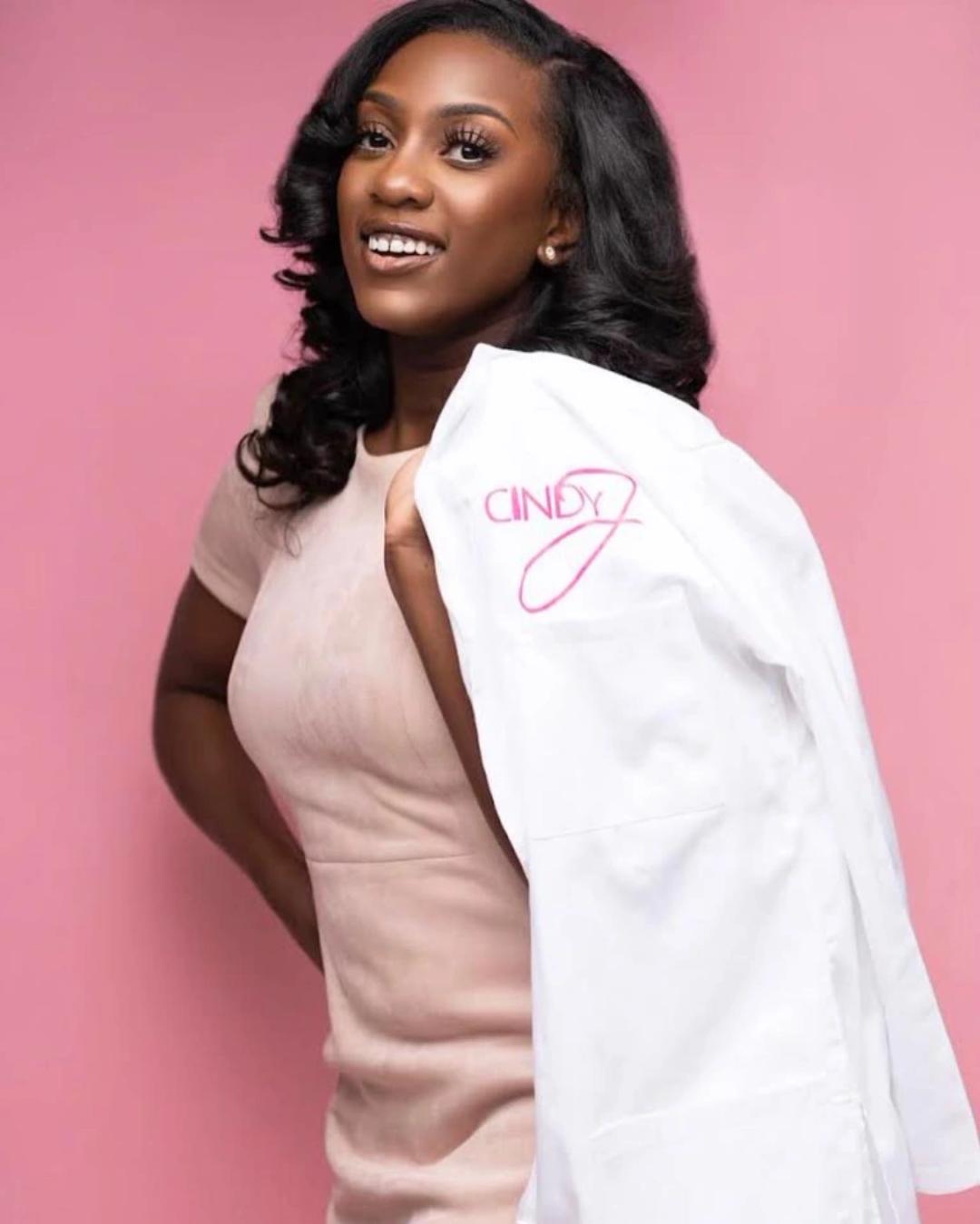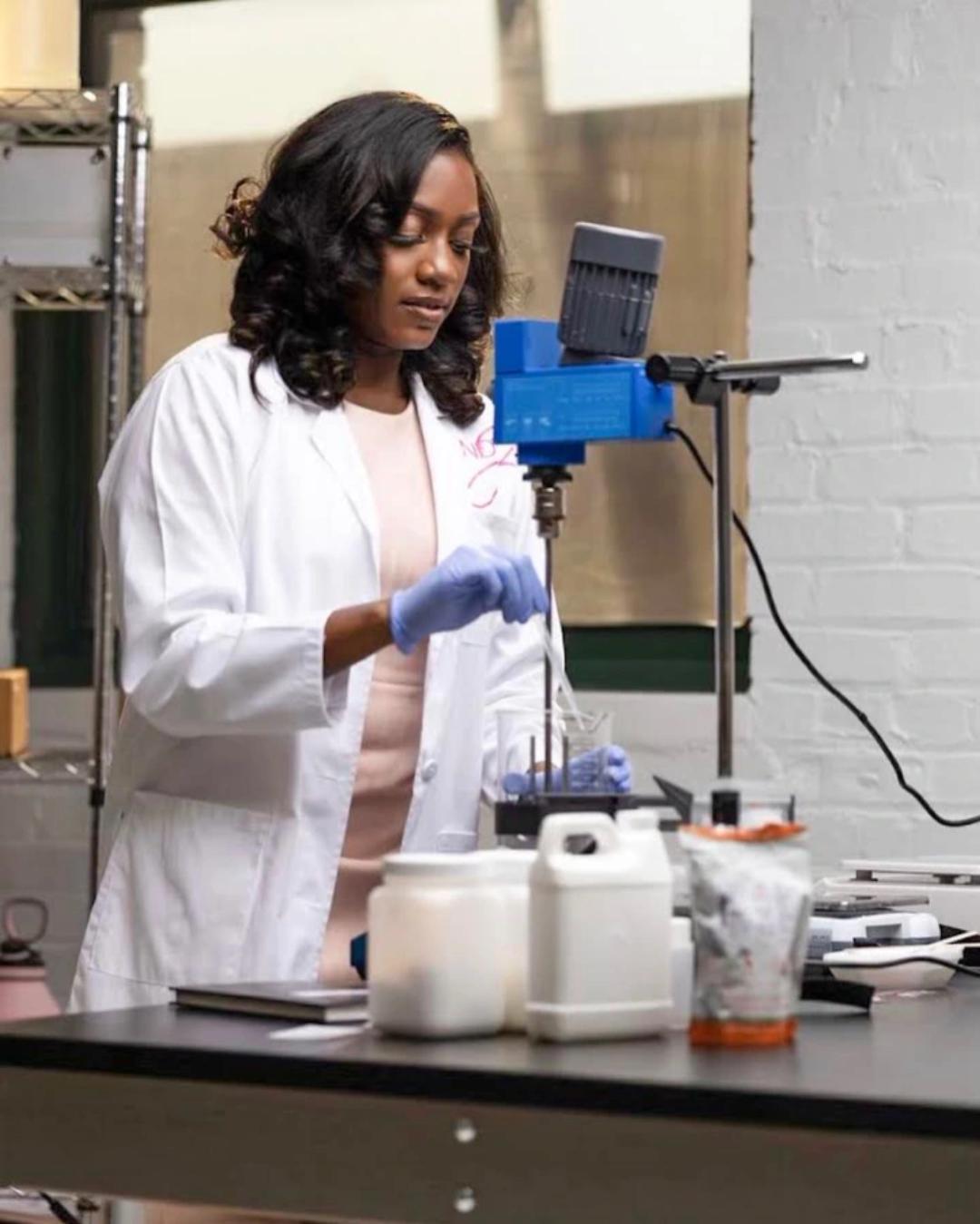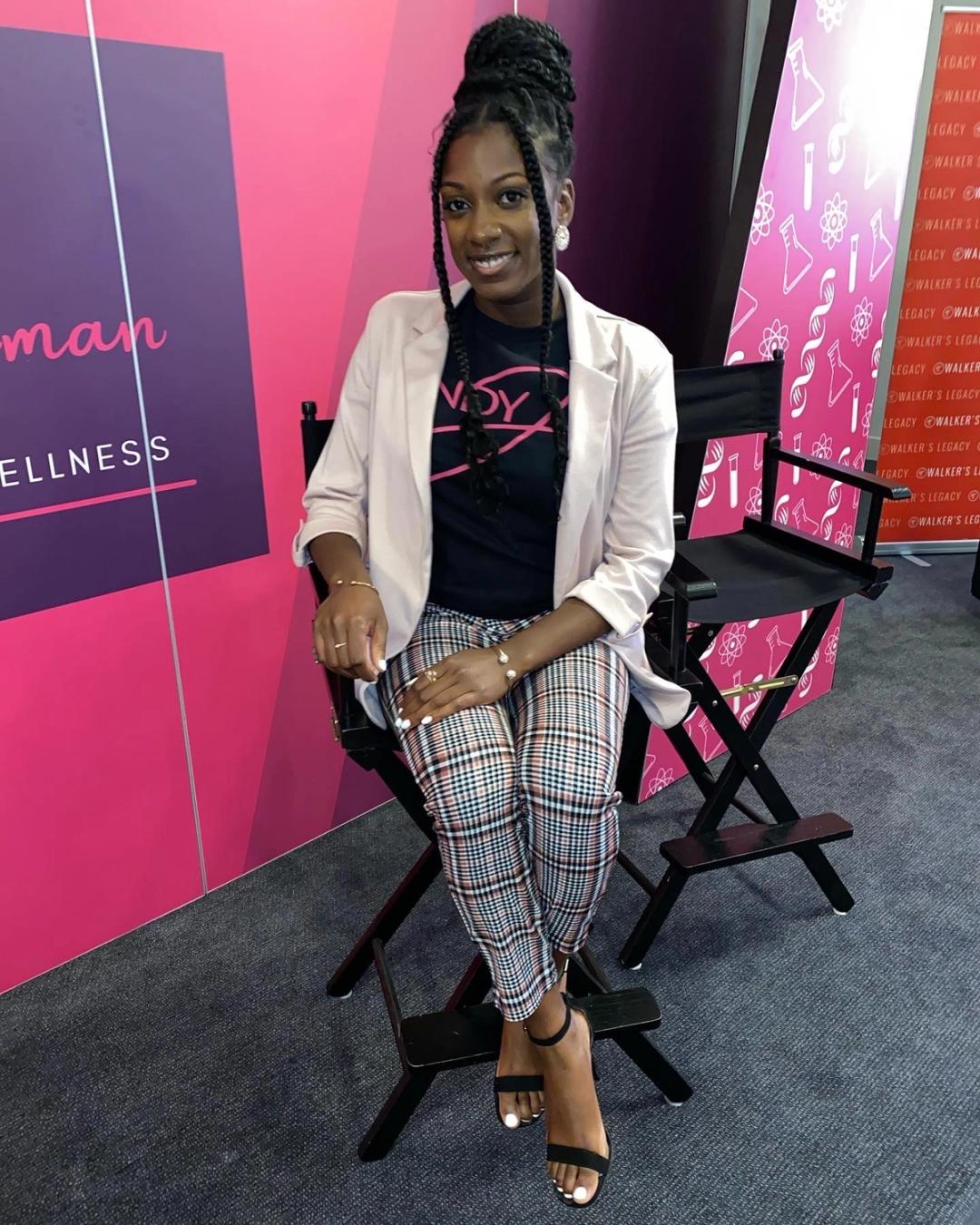Meet Cynthia Johnson
Cosmetic Chemist and Entrepreneur
Cynthia Johnson is a cosmetic chemist and the founder of Cindy J Cosmetic Labs LLC. Her company specializes in custom formulation resources and services, including manufacturing, packaging, and consultation for small business owners and beauty brands who are starting hair care or skin care lines. Inspired to help others feel confident in their hair and skin, she hopes to help expand the accessibility of the cosmetic chemistry industry.
STEM to the Sky
Aug 10, 2022
- How were you introduced to STEM, and what made you pursue cosmetic chemistry?
- What inspired you to start your own cosmetic chemistry company?
- How exactly does chemistry play a role in formulating cosmetic products?
- Do you have any favorite products that you’ve worked on in your lab?
- What are some of your future goals for your lab?
- What is the most rewarding aspect of your job?
- Is there anything that surprised you about being a cosmetic chemist?
- What does a typical workday look like for you?
- What are your thoughts on work-life balance?
- What skills would you say are important for a role like yours?
- What advice would you give to a student who is interested in pursuing cosmetic chemistry?
- What do you hope to see in the future of cosmetic chemistry?
How were you introduced to STEM, and what made you pursue cosmetic chemistry?
When I was in high school, I was an all around athlete, playing softball one season and doing track & field in another. However, basketball and volleyball were my heart and soul. After college, I knew I wanted to play in the WNBA, overseas, or even become a Baltimore Ravens cheerleader. I thought all of those things were going to happen for me, but then my chemistry professor saw a light in me that I didn’t. He said, “You’re great in chemistry, why not pursue a career in chemistry after college?” I explained to him that I didn’t want to get into pharmaceuticals or NASA, so what other field could I get into? He asked me, “What are you infatuated with? What do you love about yourself?” I told him that I loved my skin and my hair. When I was playing sports, cheerleading, and excelling in school, my self esteem was through the roof. Through hair and skin, I knew that I could potentially help others when it comes to self esteem. My professor suggested looking into cosmetic chemistry. As soon as I looked, I knew that I was supposed to be a cosmetic chemist.

(Credit: Cynthia Johnson)
What inspired you to start your own cosmetic chemistry company?
I didn’t get that entrepreneurial mindset until I was introduced to something called network marketing, which is a type of marketing that is used for independent business owners who are selling a product or service. After discovering network marketing, I knew that I was supposed to be in business and I was supposed to help others while also helping myself. I thought to myself, let’s go ahead and just open up a cosmetic science laboratory for small businesses who need that help.
Also, working as a contract manufacturing chemist, I was always helping big businesses by adding some type of technology to their products that are already on the market. It only made sense for me to apply that knowledge and experience over to smaller businesses and beauty brands. That’s where the foundation came from, and it just started growing.
How exactly does chemistry play a role in formulating cosmetic products?
A lot of the chemistry topics that we learned in the classroom carries onto creating cosmetics—pH, densities, specific gravity, viscosity, and rheology. Anything that goes into hair, we know that it has a pH of between maybe a four and five. Anything that goes on the skin, we know that has a pH between a five and a six. This is just based off of the amount of hydrogen ions are supposed to be in that product or supposed to be in your hair or on your skin. We utilize chemistry foundations to create the specifications of a product. How thick is the product supposed to be? Is the delivery system safe for the skin? Is the delivery system okay for the hair cuticle? Is the pH so high that it is going to open up the hair cuticle?
Do you have any favorite products that you’ve worked on in your lab?
My favorite skincare product has to be a gel serum. There are so many different textures, viscosities, and types of technologies that go in with gel serums that it makes you want to innovate. It makes you want to think outside the box. Do I want my gel serum to be sticky? A soft, velvety feel? A nice sheer blue? The different aspects or aesthetics of a gel serum are so broad. It doesn’t have to be specific to one product.
For haircare, I would definitely say deep conditioners. I love making deep conditioners because of the different textures that you could use or make, as well as some of the active ingredients that you can add. It’s just such a joy to make, and plus, it already looks like you can eat it. That’s always the best part.
Serum
Hair mask
Cleanser
Conditioner
(Credit: Cynthia Johnson)
What are some of your future goals for your lab?
I want to help small businesses and startup businesses with their contract manufacturing needs or their scaleup needs. After they come to me for formulation and ownership, they’re going to want a number of units to sell to their customer. But a lot of manufacturers out here are expensive or have minimum order quantities. They require you to start off with 5000 units or 1000 units, and sometimes my businesses just can’t afford it. My goal is to transition into contract manufacturing to help those business owners with those needs if you need to start off soft.
What is the most rewarding aspect of your job?
I always say, helping aspiring chemists. There are a lot of chemists and students here who need guidance. They want to learn about cosmetic science. They want to learn who’s making my shampoo or who’s making my lotion. When I was in school, I didn’t have that. I didn’t know about LinkedIn at the time or the Society of Cosmetic Chemists. It was really just going through jobs and gaining mentors. Aspiring chemists now have access to people like myself to get that guidance.

(Credit: Cynthia Johnson)
Is there anything that surprised you about being a cosmetic chemist?
I didn’t know that there were so many chemists who look like me. I’ve always had people tell me that I was going to be the one who’s the black woman or the one with the funky, cool hair or whatever the case may be. I thought a lot of chemists were white men, so when I stepped into this space and saw people who were like me, it just made it so much more rewarding to be a part of cosmetic science. We have to step out of our comfort zone and be accessible to students and other people. We have to show the world that we are here to be chemists, and we are here to help you with your needs.
“I didn’t know that there were so many chemists who look like me… I thought a lot of chemists were white men, so when I stepped into this space and saw people who were like me, it just made it so much more rewarding to be a part of cosmetic science."
CYNTHIA JOHNSON
What does a typical workday look like for you?
I always come into the lab with a positive attitude. If you start your day off on a negative route, you’re going to think negatively for the rest of the day. Of course, it starts from home. Eat a good breakfast and do the things that you need to do before you get into the laboratory.
When I arrive at work, I always check my emails because I know someone is emailing me about a product or something to do with cosmetic science. I’ll also look at some of the content that I’ve created for social media. I go through the pictures and videos I took that week and think about how I can create a Tiktok or Instagram post from that content in order to expand my audience/customer base. Usually, I’ll go to the laboratory bench at around 10:00 AM. If I’m too busy with my social media, then I’ll wait until the afternoon to create some products. I’ll also have meetings too.
So, I’m doing meetings, social media management, marketing, and I’m creating the batches. It’s definitely a hectic day, but it’s a fulfilling day. I know that each step is one step closer to my goal. Of course, I will start hiring interns, lab technicians, and social media specialists to help me with these day-to-day activities in the future.
“It’s definitely a hectic day, but it’s a fulfilling day. I know that each step is one step closer to my goal.”
Cynthia Johnson
What are your thoughts on work-life balance?
Last year was when I found out that I needed to balance my personal time and my work time; I was very busy dealing with many big life changes, and it definitely took a toll on me. I told myself that in the following years, I needed to have a balance. I started doing breathing exercises, stretching, exercising, and began eating healthier than ever before. Now my body is rejuvenated. Again, you have to develop work life balance starting at home. Then, I can transition that to my work life.
I had to discipline myself in order to develop a healthy work life balance. It’s all about that mindset.
What skills would you say are important for a role like yours?
Troubleshooting and problem solving are probably the number one skills that chemists should have when it comes to the technical pieces of cosmetic science. If a customer is not satisfied with their product, how can I solve this problem? How can we gain that trust again from the customer so that they know that the next product that we come out with is going to be the best?
Never be afraid of asking questions. It’s part of the troubleshooting and problem solving skill set. That’s why it’s important to have mentors and communities of peers to help you along the way.
Being an entrepreneur and cosmetic chemist in my own laboratory, I would definitely say communication and time management skills are important. Again, back to time management, you don’t want to feel overwhelmed. You want to step back and plan out your days, weeks, and months. You have to be able to communicate on a positive level and not a negative level. You want to be able to communicate through not only your words but also your actions.
“You want to be able to communicate through not only your words but also your actions.”
Cynthia Johnson
What advice would you give to a student who is interested in pursuing cosmetic chemistry?
Especially within the GenZ community, I often hear about impostor syndrome. If you can wake up in the morning, and you know that you are supposed to be a chemist, or you’re supposed to be a writer, teacher, lawyer, or whatever the case may be, then that is the vision that you are supposed to fulfill. When I woke up today, I envisioned myself as a cosmetic chemist, working as a contract manufacturer manager, working as a CEO of a resource development tool, working as a manager of a salon—whatever the case may be—I’m not going to have that imposter syndrome. I’m going to work towards it because that’s where I’m supposed to be.
Look up the Society of Cosmetic Chemists and you’ll find so many resources for cosmetic chemistry, including mentors and events. I’m currently the chair of the Mid-Atlantic chapter. There are so many different types of events that can help you with educational needs through the Society of Cosmetic Chemists. Students can also look up the Journal of Cosmetic Science as a huge resource when it comes to learning about how to formulate. Students can also go to websites like the Chemist Corner or UL Prospector. UL Prospector actually has formulas for you to take a look at and see how the type of formula is good for you or even learn about ingredients. There are thousands of ingredients in the cosmetic science space.

(Credit: Cynthia Johnson)
What do you hope to see in the future of cosmetic chemistry?
I see more cosmetic chemists coming out of their comfort zone. I see a lot of cosmetic chemists online on social media debunking a lot of the myths out there about cosmetic science or ingredients. I see a lot of the big brand owners reaching out to people of color for cosmetic chemistry or to create their product or their new innovative idea. Of course, we have work to do on both ends, as brand owners and cosmetic chemists, but I do see a positive light when it comes to diversity and inclusion.